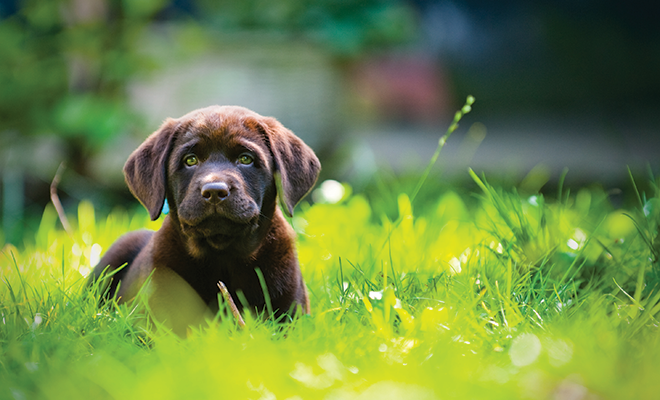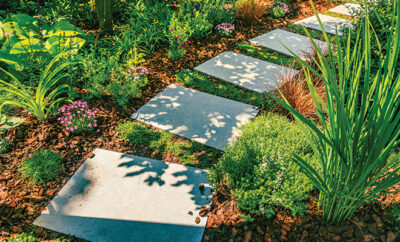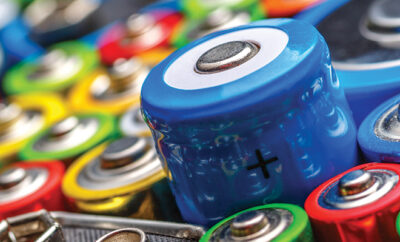
Living Green with Your Pets
Principles of sustainability include recycling, using natural products, reducing energy usage and thinking about our impact on Mother Earth. It’s estimated that 65 percent of Americans live in households with pets. How are these two statements related?
It’s this: pet owners are choosing to extend their embrace of the natural, sustainable practices with which they live to their pets. Foods, shampoos, toys, bedding, eco-friendly behavior of manufacturers and veterinarians are more than just trendy. They’re making a lasting impact.
Veterinarians
The American Veterinary Medical Association’s One Health initiative is “the integrative effort of multiple disciplines working locally, nationally and globally to attain optimal health for people, animals and the environment.” The geographical expansion of population increases the contact between humans and wild animal habitats, introducing the risk of exposure to new viruses, bacteria and disease-causing pathogens. As such, the global veterinary community is increasing awareness of the interdependence of the health of humans, animals and the environment.
AVMA encourages veterinary practices to invest in energy-efficient equipment, lighting and mechanical systems. The use of eco-friendly cleaning products can reduce the use of chemicals in maintaining standards of cleanliness, and converting to digital radiography can reduce the amount of paper generated.
Entrepreneurs
Lanette Fidrych seized a green opportunity when she began collecting tubes from bike shops and repurposing them, creating the iconic inner tube-backed dog collar. Since 2009, Cycle Dog of Portland, Oregon, has reclaimed hundreds of thousands of tubes destined for landfills. The rubber backing of the collars doesn’t allow bacteria to grow, so they stay fresher smelling. Cycle Dog’s product line includes hand-sewn products made in the USA from post-consumer recycled materials, a waste pickup bag made from plant and corn starches that’s biodegradable and soap that’s free of detergents and chemicals.
Molly Mutt’s founder lived on a hilltop in San Francisco and tired of hauling muddy dog beds up and down hills to the laundromat. Her solution was to create a line of fashion-forward dog bed duvets that come with a sack into which the pet owner stuffs their old clothes, bedding, pillows, towels and other soft items. The up-cycled clothing already has your dog’s favorite scent–its owner’s–so it’s immediately the canine’s best-loved resting place. The beds are affordable, washable, durable, and they solve the additional issue of keeping the pet off the furniture. Other eco-friendly solutions from Molly Mutt are pesticide-free wool-filled crate pads and cute collars and leads of sustainable bamboo webbing.
The solutions of pyrethrin and pyrethroid used for flea and tick control can sometimes make pets very sick. Pyrethrin is derived from the Chrysanthemum cinerariaefolium plant and from pyrethrum-related plant species. Pyrethroids are synthetic rather than naturally based. Reactions to insecticides can range from vomiting, diarrhea and depression to excessive salivation, itching and congestion. In 2009, Stephanie Boone responded to her dog’s pesticide poisoning by developing Wondercide, which contains the active ingredient cedar oil and comes in Rosemary, Cedar and Cedar-Lemongrass fragrances. A year ago, Stephanie and her marketing officer, Laura Alter, appeared on Shark Tank and secured Lori Greiner as an investor. The company’s offerings include natural-ingredient holistic solutions for pest control and pet care for dogs, cats and humans, plus yard and garden products for flea, tick and mosquito control.
Manufacturers
Healthy Pet®’s mantra is “We were green, before green was a thing.” For 25 years, the manufacturer of products for small animals has incorporated cellulose fibers from sustainable sources in its products and packaging. The wood used for several of its cat litters is sourced with guidelines from PEFC, the Program for Endorsement of Forest Certification, an international, non-profit NGO that promotes sustainable forest management. Their biodegradable cat litter, ökocat, is made with plant fibers that naturally absorb liquids and trap odors. It’s naturally lightweight, degrades quickly and has the convenience of being flushable. The dust-free formulation of paper pellets is good for families with allergies, asthma and respiratory sensitivities. Their bedding for small animals, such as hamsters and rabbits, is made from natural reclaimed paper fibers and contains a proprietary formula that stops ammonia odors for up to ten days.
Paw5’s core values are sustainability, integrity and thoughtful design, and their mission statement is “to become a model company in the pet industry for great products, uncompromising ethics, great company culture, and a leader in economic, social, and environmental sustainability.” The company’s Rock ’N Bowl is made in a zero-waste process only 300 miles from their Philadelphia headquarters, and the Wooly Snuffle Mat removes two pounds of textiles from landfills by using safe recycled fabrics.
Owners
Ask your vet if she has a take-back program for unused pharmaceuticals; perhaps they can be donated to another client who can’t afford them. If you forget your cloth grocery bags and come home with plastic, use them as pickup bags on your next walk. Brainstorm with your fellow pet owners and veterinarian and share ideas for sustainability; together we can continue the green pet revolution!■
Sources: avma.org, healthy-pet.com, packagedfacts.com, paw5.us, petage.com, petsustainability.org, williamsonsource.com and wondercide.com.







